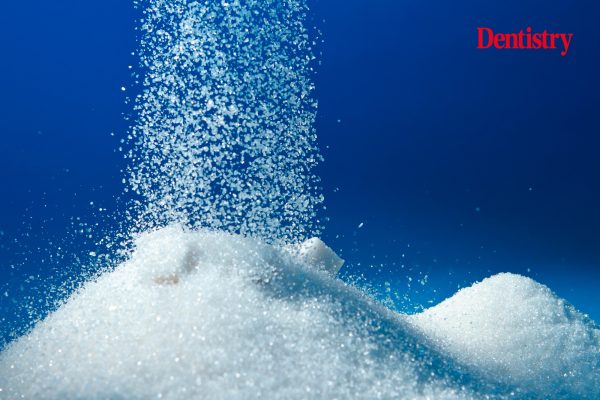
With increasing levels of sugar found in all our food, it’s time we took a stand. Here, Dentistry launches its Sugared Out campaign.
Sugar is everywhere and added to almost all non-fresh foods that we purchase from supermarkets.
The UK’s sugar consumption has increased over the decades with The Guardian now reporting Britons as having the highest sugar intake in Europe, and it is dental professionals who are seeing the repercussions.
According to Comprehensive Reviews in Food Science and Food Safety, there are five reasons to add sugar to food and increasing sweetness is only one of them.
The rest are functional properties:
- Preservation
- Colour
- Fermentation
- Bulk and texture.
Dentists and dental professionals see day in day out that the increase of sugar in our diet is leading to numerous health issues, but most pressing is weight gain and tooth decay.
How much sugar should we eat?
The NHS states: ‘The government recommends that free sugars – sugars added to food or drinks, and sugars found naturally in honey, syrups, and unsweetened fruit and vegetable juices, smoothies and purées – should not make up more than 5% of the energy (calories) you get from food and drink each day.’
How can professionals put this into context for patients?
- For adults it equates to 30g of free sugars a day (around seven sugar cubes)
- Children aged seven to 10, no more than 24g (six sugar cubes)
- Children aged four to six, no more than 19g (five sugar cubes)
- And those under four should avoid all sugar-sweetened drinks and food.
And to simplify it even further, one Mars bar contains 30.5g of free sugars. That is more than the adult recommended amount for a whole day!
How much are patients eating?
According to the most recent National Diet and Nutrition Survey, free sugars exceeded maximum recommendations in all age groups in the UK.
However, the amount of free sugars we consume varies between age groups and backgrounds; free sugar intakes tended to be higher in participants from households with lower food or financial security for example – mirroring what the profession sees with tooth decay.
Those aged 11-18 years have the highest intake of free sugars at 54.9g, with 19-63 years following closely behind at 49.7g.
Worryingly, younger age groups also showed high sugar intake; four to 10 years are consuming 47.3g and those under three are consuming 27.9g. This is despite the government recommending this age group avoids free sugars altogether.
What does this mean for dentistry?
As dentists and professionals are well aware, sugar plays a crucial role in the formation of bacteria within plaque, which produces the acid responsible for tooth decay.
Recent figures show children’s tooth decay costs the NHS more than £40 million every year.
The Adult Dental Health Survey (2009) estimates one in three adults suffer from dental caries and one in four children suffer from some form of tooth decay.
Despite this, the government recently decided to defer a ban on multi-buy deals and junk food TV advertising pre watershed.
It blamed the cost of living crisis as the reason behind the 12-month delay.
While on the other side the government increased National Insurance payments to cover the rising cost of healthcare.
How has the sugar tax helped?
In April 2018 the government introduced the Soft Drinks Industry Levy – also known as the sugar tax.
Since 2018, companies are taxed:
- 24p per litre if a soft drink contains 8g of sugar per 100ml
- 18p per litre if a soft drink contains between 5-8g per 100ml.
But actually, the government claims the sugar tax announcement in 2016 resulted in over 50% of manufacturers reducing the sugar content of drinks before the tax was actually introduced.
And Cambridge University researchers found UK households bought 10% less sugar through soft drinks the year after the tax was introduced.
The government promised that money raised from the sugar tax would go to children’s health programmes.
However, Dentistry.co.uk reported at the start of this year that despite raising more than £800 million, this money has instead been pumped into the ‘general tax pot’.
We’re sugared out
Taking all this into account, we at Dentistry are completely ‘sugared out’.
We’re launching our Sugared Out campaign to highlight the detrimental impact sugar has on our oral health and to campaign the government to do something about it.
And to do this we’re asking for your help.
Sign our petition and, when we have enough signatures and support, we will get a meeting with an MP to discuss the rising amount of sugar in patient’s diets.
Simply visit www.dentistry.co.uk/sugared-out.
In the meantime, we’ll bring you interviews from key opinion leaders and facts and figures about the impact sugar is having on our health for you to help keep patients informed.
Sign our sugared out petition. Simply go to www.dentistry.co.uk/sugared-out.


